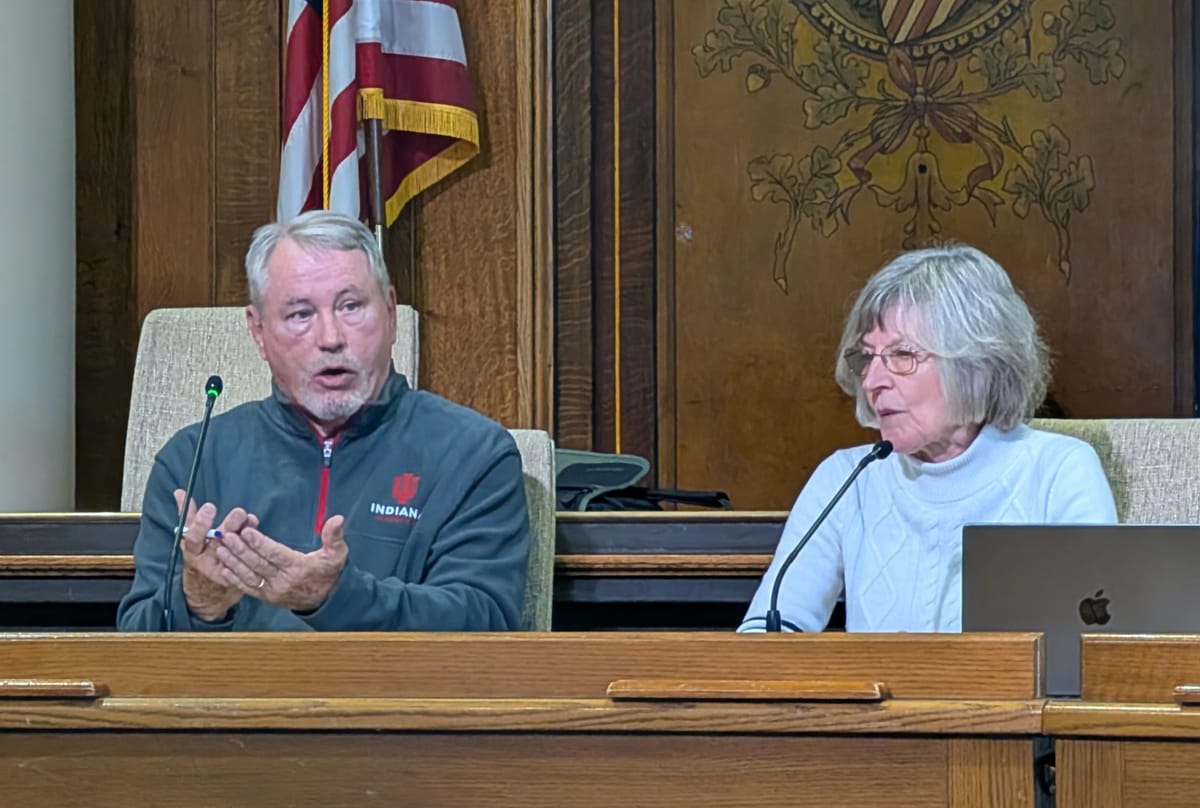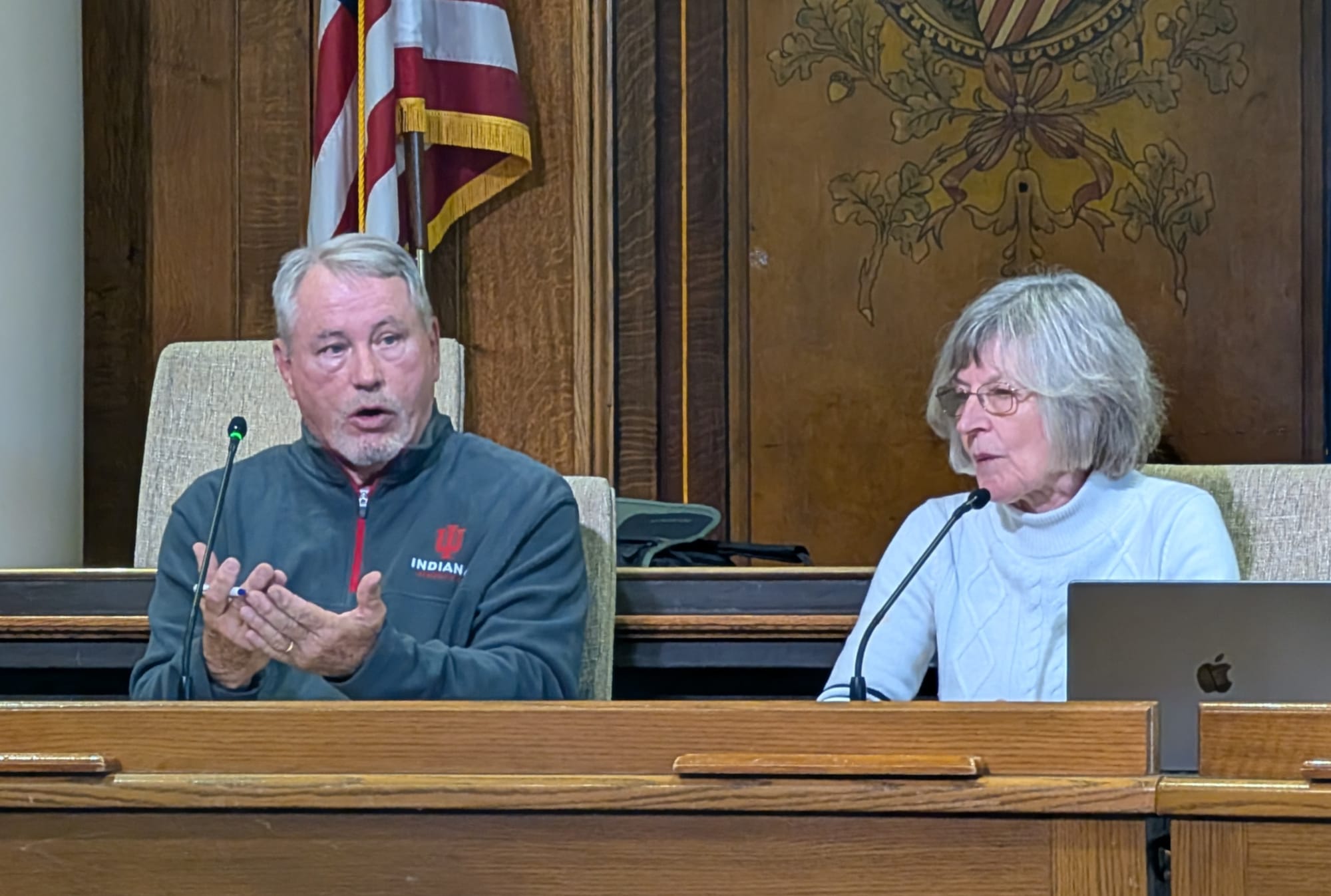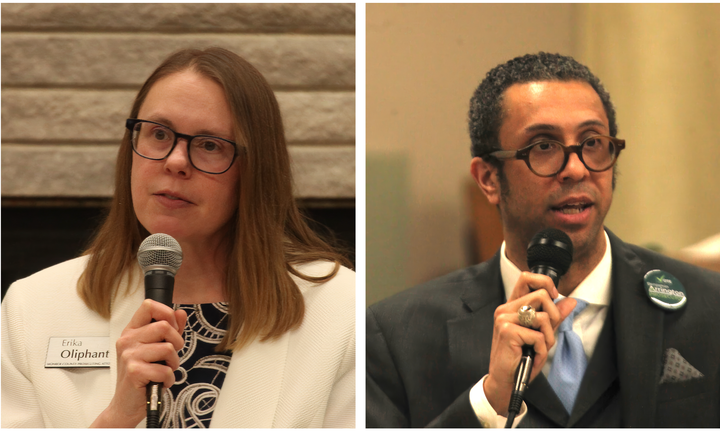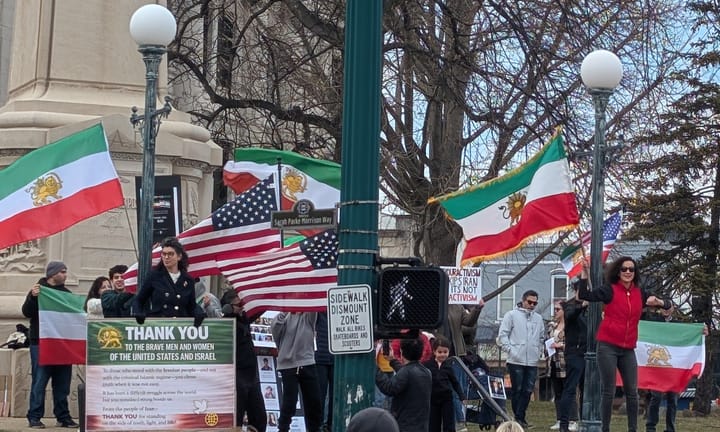After fiery Monroe County election board meeting, vote centers still nonstarter ‘in the short term’
After a contentious election board meeting on Thursday, and a meeting between the two county chairs of the major political parties on Friday, Monroe County does not look like it’s any closer to adopting vote centers as a way for registered voters to cast their ballots.


Thursday’s (Oct. 23) hour-long special meeting of the Monroe County election board was one of the most contentious public meetings by any local governing body in recent years.
The topic of the dispute was whether the question of establishing vote centers in Monroe County should be reopened, after a 2–1 vote in favor of adopting vote centers failed in the spring of this year. A vote to establish vote centers, instead of precinct-based voting locations, is required to be unanimous on the three-member partisan-balanced board.
After the election board meeting on Thursday, and a meeting between the two county chairs of the major political parties on Friday, Monroe County does not look like it’s any closer to adopting vote centers as a way for registered voters to cast their ballots.
The party chairs are both relatively new to those particular roles. Cory Grass was elected chair of the Monroe County Republican Party in May of this year. In a mid-July party caucus, Chrissie Geels was moved from vice-chair to chair of the Monroe County Democratic Party, to replace Samuel Ujdak, who resigned.
But the key actors in the public dispute on Thursday were Penny Githens, the Democratic Party’s appointee, and Danny Shields, the Republican Party’s appointee. Rounding out the election board’s membership is Nicole Browne, a Democrat who serves on the board in her capacity as the elected county clerk.
Shields said at the board’s meeting earlier this month, and repeated the sentiment on Thursday, that he had seen no new information that would lead him to change his mind on the question of vote centers. He added that the chair of the party and other local Republicans are against establishing vote centers, so his vote would remain no, which meant there was no point to reopening the question.
Part of the mix is the fact that converting to vote centers between now and the start of early voting for the 2026 primary—which is about five months away in early April 2026—would be a logistical challenge. The added number of printing devices to generate ballots on demand are one of the logistical hurdles.
Secretary of state’s study of vote centers
Thursday’s special meeting was called after Githens made a gambit at the board’s regular meeting, earlier this month, to reopen the vote center question—by scheduling the public hearings that are required to come before an election board vote. That effort ended in a consensus to hold open the possibility of scheduling a special meeting later in the month, after Shields got feedback from Indiana’s secretary of state, Diego Morales, who is also a Republican. The special meeting was set for Thursday.
Under an act that the legislature passed this spring, Morales is supposed to estimate any cost savings that might result from a requirement all counties to use vote centers, how those changes would affect voter turnout, hold at least three public meetings on the proposals, and to submit a report with the findings to the state’s Legislative Council by Nov. 1, 2025. The three public meetings have already been held.
Even though the state legislature’s mandate directing the secretary of state’s work does not include a recommendation from Morales one way or another, it’s perceived by some that Morales’s report will serve as a recommendation. Action by the General Assembly to require vote centers in all 92 counties of the Hoosier state could come during its 2026 session. The current count of counties that use vote centers is 71.
The report on what Shields learned from his phone conversation with Morales did not come almost a half hour into Thursday’s meeting. Shields told his board colleagues that, “[the secretary of state’s] personal choice is precinct voting, because it’s more secure in his mind.” Shields continued saying that Morales had told him that Morales did not anticipate vote centers being mandated by the state legislature.
Early friction during Thursday’s meeting
Some existing tension between Githens and Shields can be traced to the election of Shields as chair of the board in early September. Shields and Browne joined in a cross-party vote to put Shields in the chair’s seat over dissent from Githens.
Before Thursday’s meeting even got to the topic of vote centers, which had prompted the meeting, tensions between Githens and Shields surfaced in connection with what is normally a perfunctory step in any meeting. That step is the approval of minutes from a previous meeting. Githens objected to the way her comments about provisional ballots had been characterized in the minutes. An extended back-and-forth took place, which included Browne, who is under state law the secretary to the board, and Monroe County election supervisor Kylie Farris.
Even though amended minutes were approved, the exchange foreshadowed the contentious debate between Shields and Githens, as well as between Shields and speakers from the public mic.
Debate over vote centers
Part of Thursday’s meeting included an update on the project to remodel a part of the county-owned Showers North building to accommodate early voting and voter registration activity.
But attention eventually shifted to the question of scheduling two public hearings on the adoption of vote centers—hearings that are required as a part of the statutory process to change to a system that would allow voters to cast ballots at any county polling location.
Githens leaned on the standard arguments for vote centers, which include potential cost savings, more flexibility for election officials, reduction in the number of voting machines required, and convenience to voters.
Githens turned to Shields and said: “You know, it’s Republicans that talk about waste and fraud, waste and fraud, waste and fraud. I think this is a waste of money to not have vote centers.”
Shields is skeptical of the cost savings, and responded by saying the fiscal body of county government should provide an analysis: “Maybe you should’ve asked your county council to put together a plan that shows exactly where they’d put [vote centers] and how much money they’d save.” Githens shot back: “The county council does not do that.”
Shields replied: “The county council handles the money.” Githens responded: “It’s the county commissioners that approve where the vote centers go.” Shields replied: “Then have the commissioners do it, and then let me take that back to my leadership, and they might change their mind.”
Commentary from the public mic
The public comment portion of the meeting featured support for vote centers from several speakers, including accusations of lying. Ashlie Kehrberg told Shields, “You lied to The B Square,” when he provided a document with data summarizing the voter turnout in counties with vote centers. Shields had relied in part on the numbers to inform his vote against vote centers. Animated back-and-forth ensued between Shields and Kehrberg.
Shields said he got the numbers from the state’s website, and had been helped by another person. At issue is whether the counties in the list were all, in fact, vote center counties for the years data was provided. According to the state’s website, Brown County, for example, adopted vote centers just this year, so the numbers for prior elections in Brown County would not count as evidence about turnout in a vote center county. Other counties in the list Shields provided, like Marion County, have had vote centers since 2018, according to the state’s website.
In any case, Shields’s takeaway from those numbers was that vote centers don’t necessarily improve voter turnout. That’s also the conclusion of Monroe County’s vote center study committee, which provided the proposed plan for vote centers on which the vote earlier this year was based. From the committee’s report: “Interviews, email, and websites from eight other Indiana counties suggest that there was not a great impact in either voter participation or in the costs of running elections when adopting a vote center model.”
Also speaking from the public mic was Regina Moore, former Bloomington city clerk for Bloomington and longtime Democrat. Moore criticized in particular the part of Shields’s arguments that relied on a perceived disrespect that the local Republican Party had been shown by local Democrats.
Examples given by Shields included a planning commission appointment in the city of Bloomington, which Republicans contended should have been made by the GOP party chair. A lawsuit was filed, and the GOP prevailed in the lower court. But a court of appeals panel overturned the ruling. The other case of disrespect cited by Shields involved the perceived slow-footing of a Republican’s appointment to the county board of health, which is partisan balanced under state law. The appointment in question was that of Republican Lisa Hanner-Robinson.
In a phone interview on Saturday, Grass told The B Square that a Republican appointment to the board of the aviation commissioners had also been a point of contention.
During Thursday’s meeting, Shields put it like this: “So when we get some cooperation ourselves as a party on those kinds of things, we might be willing to talk about these kinds of things.” Alluding to the one vote of dissent that the Republican Party can use to prevent the implementation of vote centers, Shields said, “We don’t have a great deal of power, but we’re going to use what power we have.”
In her turn at the public mic on Thursday, Moore called it "disingenuous" to conflate the board’s responsibilities with unrelated partisan grievances. Moore said that the issue of vote centers demands more than simply following the dictates of the party.
Friday’s meeting of the party chairs
Thursday’s election board meeting ended with another postponement of the question of holding hearings on vote centers, this time until the election board’s December meeting, which is scheduled for Dec. 4.
Providing some hope that there could be movement on the vote center issue, was a previously scheduled meeting between the two party chairs and Browne, set for the following day. Browne cited the scheduled meeting as a chance to talk about the vote center question, so that Shields might receive some different instructions from the party chair.
Based on a Facebook post from Republican chair Cory Grass after the Friday meeting between him and Geels, it does not appear there’s any realistic chance for movement on the vote center question. Grass’s post led off with this: “Monroe County Dems are up to their same old tricks. When they don’t get what they want, they behave like petulant children and harass anyone and everyone they can to try and get their way.”
Grass was referring to an earlier Facebook post from Githens, where she went through the arguments for vote centers that she had given at Thursday’s meeting.
Based on Grass’s post, he was not expecting vote centers to be a topic of the meeting and he confirmed that was his expectation, when The B Square reached him by phone.
Geels told The B Square the same thing—that she also had not understood voter centers to be the planned topic of the meeting. She said she had prepared a list of 20 questions about election procedures and poll recruiters, because that was her understanding of the meeting topic. Geels said it was not the case that she and Browne had somehow “teamed up as Democrats to trick [Grass] into having this meeting.”
Grass confirmed that Geels didn’t say anything about vote centers during that part of the conversation.
Grass also said it is, at least in the short term, fair to say that he considers the issue of vote centers to be dead. Asked how long the “short term” is, Grass spoke of the “mutual respect” that is needed—which would be seen in smoother Republican appointments to partisan-balanced boards and commissions.
Logistically, it seems impossible to contemplate implementing vote centers in time for 2026 elections. What about 2027, when municipal elections are held? About that possibility, Grass said, “Let’s see how it goes for the next year.”




Comments ()